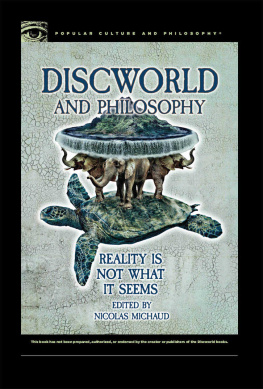Table of Contents
Popular Culture and Philosophy
SERIES EDITOR: GEORGE A. REISCH
VOLUME 1
Seinfeld and Philosophy: A Book about Everything and Nothing (2000)
VOLUME 2
The Simpsons and Philosophy: The Doh! of Homer (2001)
VOLUME 3
The Matrix and Philosophy: Welcome to the Desert of the Real (2002)
VOLUME 4
Buffy the Vampire Slayer and Philosophy: Fear and Trembling in Sunnydale (2003)
VOLUME 5
The Lord of the Rings and Philosophy: One Book to Rule Them All (2003)
VOLUME 6
Baseball and Philosophy: Thinking Outside the Batters Box (2004)
VOLUME 7
The Sopranos and Philosophy: I Kill Therefore I Am (2004)
VOLUME 8
Woody Allen and Philosophy: You Mean My Whole Fallacy Is Wrong? (2004)
VOLUME 9
Harry Potter and Philosophy: If Aristotle Ran Hogwarts (2004)
VOLUME 10
Mel Gibsons Passion and Philosophy: The Cross, the Questions, the Controversy (2004)
VOLUME 11 More Matrix and Philosophy: Revolutions and Reloaded Decoded (2005)
VOLUME 12 Star Wars and Philosophy: More Powerful than You Can Possibly Imagine (2005)
VOLUME 13
Superheroes and Philosophy: Truth, Justice, and the Socratic Way (2005)
VOLUME 14
The Atkins Diet and Philosophy: Chewing the Fat with Kant and Nietzsche (2005)
VOLUME 15
The Chronicles of Narnia and Philosophy: The Lion, the Witch, and the Worldview (2005)
VOLUME 16
Hip Hop and Philosophy: Rhyme 2 Reason (2005)
VOLUME 17
Bob Dylan and Philosophy: Its Alright Ma (Im Only Thinking) (2006)
VOLUME 18
Harley-Davidson and Philosophy: Full-Throttle Aristotle (2006)
VOLUME 19
Monty Python and Philosophy: Nudge Nudge, Think Think! (2006)
VOLUME 20
Poker and Philosophy: Pocket Rockets and Philosopher Kings (2006)
VOLUME 21
U2 and Philosophy: How to Decipher an Atomic Band (2006)
VOLUME 22
The Undead and Philosophy: Chicken Soup for the Soulless (2006)
VOLUME 23 James Bond and Philosophy: Questions Are Forever (2006)
VOLUME 24
Bullshit and Philosophy: Guaranteed to Get Perfect Results Every Time (2006)
VOLUME 25
The Beatles and Philosophy: Nothing You Can Think that Cant Be Thunk (2006)
VOLUME 26
South Park and Philosophy: Bigger, Longer, and More Penetrating (2007)
VOLUME 27
Hitchcock and Philosophy: Dial M for Metaphysics (2007)
VOLUME 28
The Grateful Dead and Philosophy: Getting High Minded about Love and Haight (2007) Edited by Steven Gimbel
VOLUME 29
Quentin Tarantino and Philosophy: How to Philosophize with a Pair of Pliers and a Blowtorch (2007) Edited by Richard Greene and K. Silem Mohammad
VOLUME 30
Pink Floyd and Philosophy: Careful with that Axiom, Eugene! (2007) Edited by George A. Reisch
VOLUME 31
Johnny Cash and Philosophy: The Burning Ring of Truth (2008) Edited by John Huss and David Werther
VOLUME 32
Bruce Springsteen and Philosophy: Darkness on the Edge of Truth (2008) Edited by Randall E. Auxier and Doug Anderson
VOLUME 33
Battlestar Galactica and Philosophy: Mission Accomplished or Mission Frakked Up? (2008) Edited by Josef Steiff and Tristan D. Tamplin
VOLUME 34 iPod and Philosophy: iCon of an ePoch (2008) Edited by D.E. Wittkower
VOLUME 35
Star Trek and Philosophy: The Wrath of Kant (2008) Edited by Jason T. Eberl and Kevin S. Decker
VOLUME 36
The Legend of Zelda and Philosophy: I Link Therefore I Am (2008) Edited by Luke Cuddy
VOLUME 37
The Wizard of Oz and Philosophy: Wicked Wisdom of the West (2008) Edited by Randall E. Auxier and Phillip S. Seng
VOLUME 38 Radiohead and Philosophy: Fitter Happier More Deductive (2009) Edited by Brandon W. Forbes and George A. Reisch
IN PREPARATION:
Jimmy Buffett and Philosophy (2009) Edited by Erin McKenna and Scott L. Pratt
Stephen Colbert and Philosophy (2009) Edited by Aaron Allen Schiller
Transformers and Philosophy (2009) Edited by John R. Shook and Liz Stillwaggon Swan
Supervillains and Philosophy (2009) Edited by Ben Dyer The Golden Compass and Philosophy (2009) Edited by Richard Greene and Rachel Robison
World of Warcraft and Philosophy (2009) Edited by Luke Cuddy and John Nordlinger
Anime and Philosophy (2009) Edited by Josef Steiff and Tristan D. Tamplinin
1 Step
Phew. For a minute there, we lost ourselves. We were about to publish this book without a price and ask Radiohead fans to pay what they want for it. But then we remembered. While the music industry was up-ended in 2007 by the debut of In Rainbows and other albums distributed by artists themselves, the world of book publishing remains a few steps behind. For now, at least.
Philosophy, though, has no difficulty keeping up with Radiohead. We had a pretty good hunch going into it, but putting this book together made it plain to us that there are good reasons why Radiohead has succeeded The Clash as The Only Band that Matters. Some of those reasons are philosophical. Not that Radiohead says much about competing theories of truth or subtleties of the mind-body problem (for humans or androids). Instead of abstractions, Radioheads music points toward philosophical analyses of actual experiences in the world. Yes, some of these experiences were analyzed by Aristotle, Nietzsche, and Heidegger, but others belong exclusively to us, here and now. As Mark Greif put it in his groundbreaking essay, Radiohead, or the Philosophy of Pop (included here), Radiohead not only suggests the question, How should it really ever be possible for pop music to incarnate a particular historical situation? They show how its done.
Take the video for In Rainbows House of Cards. Because it uses cutting-edge three-dimensional modeling technology, we dont actually see Thom Yorkes face as he sings the song and attends a neighborhood party. Instead, a rotating laser digitally captures the events, the people, and the houses. In our world, the video reminds us, only the underlying data mattersour very lives and selves, in many ways, are now digital. Radiohead pushes this insight to its artistic limit by making available the videos source code so that end users (previously known as fans before our digital age) can manipulate and re-image the data for themselves. This is one of many philosophical spaces Radiohead has opened for usspaces in which their music, their worldview, and their encounter with the world can connect to our own.
Whether its because of their Oxford pedigree or just raw talent and intelligence, Radioheads effortless fusion of Joe Strummers politics with the technological interrogation of the Talking Heads (to whom they owe their name) leads all of the scholars in this book to fascinating and new encounters with philosophy. From Heideggers phenomenology and the manipulation of Yorkes voice on






